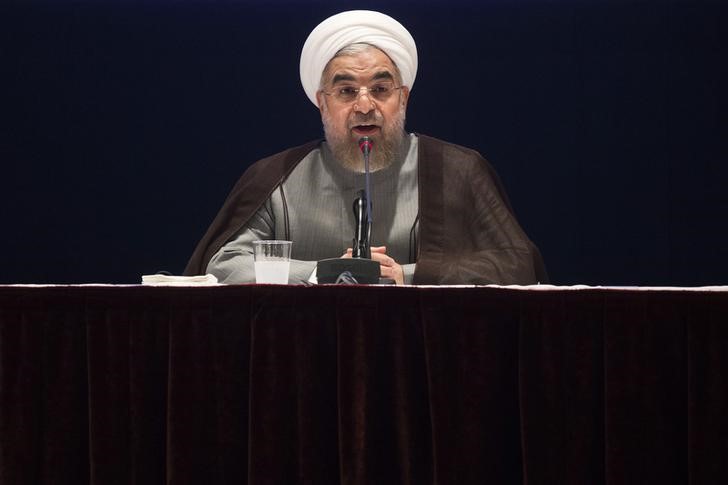By Mehrdad Balali and Michelle Moghtader
DUBAI (Reuters) - Hardliners rounded on President Hassan Rouhani on Tuesday after negotiators failed to end the Iranian nuclear dispute but the man who ultimately matters, the country's supreme leader, tacitly backed a renewed push for a deal.
Iranians faced the prospect of at least several more months of international sanctions that have badly hurt their living standards, after Tehran and six world powers missed a self-imposed deadline on Monday for a nuclear settlement.
But Supreme Leader Ayatollah Ali Khamenei gave his blessing after negotiators in Vienna allowed themselves seven more months to overcome the deadlock over the nuclear programme, which the West fears has military aims despite Tehran's denials.
This extension keeps alive hopes among Rouhani's supporters of an eventual deal that would shore up the power of the 66-year-old lawyer and cleric, an unashamed pragmatist, and possibly lead to wider economic and social reform at home.
After Rouhani soundly beat conservative rivals to win a presidential election last year, the hardliners were unlikely to be happy whatever the outcome of the negotiations with the United States, China, Russia, France, Britain and Germany.
They remain suspicious of reaching any compromise with the West, after Rouhani promised during campaigning to end the sanctions by resolving the nuclear dispute and reengaging Iran with the outside world.
But equally they demanded explanations from Rouhani about why a year of talks that he helped to arrange had failed to produce a compromise by Monday, the second deadline to have been missed.
BROKEN OPTIMISM
Chants of "Death to America", a slogan Rouhani's sympathisers avoid using, punctuated a meeting of lawmakers on Tuesday.
"It's already a year since Mr Rouhani tried his magic key to turn around America's wolfish nature. Instead of turning, the key of trust and optimism broke in the lock," said Hamid Rasaei, a member of parliament and close ally of hardline ex-president Mahmoud Ahmadinejad.
"We have no idea what happened in Vienna ... What has been agreed upon in Vienna?" he asked on the floor of the assembly.
Rouhani told state TV that progress had been made in the talks, an assertion backed by U.S. Secretary of State John Kerry, and that he was sure a deal would be concluded one day.
But conservatives tried to cast Rouhani's government as insufficiently robust in its stance on the nuclear work, a damaging charge if his opponents could make it stick.
"The reality of the negotiations over the past year shows that one needs to talk to America and its (Western) allies from a position of power, the language of force," said deputy speaker of parliament Mohammad Hassan Abutorabi.
"Only a nation that has the upper hand can defend its interests in the present world order, the language of force."
The Tehran Stock Exchange index fell about 1.5 percent, largely on sentiment related to the extension of the talks, the official IRNA news agency reported stock exchange analyst Hamed Satak as saying.
But the fact that Rouhani's negotiating team had evidently stood its ground on major issues was seen as a badge of honour by some, including Khamenei, on the conservative end of Iran's political spectrum.
"The extension gives both sides, Rouhani and the hardliners, more time to try to sway public opinion," Isa Saharkhiz, a reformist former government official, told Reuters by phone.
Khamenei issued a message on Twitter saying "arrogant" powers would not bring Iran to its knees, a remark that implicitly recognised the talks would carry on. Khamenei exercises immense power, including over foreign affairs.
"GOOD JOB"
Mohammad Reza Bahonar, a lawmaker close to Khamenei, was explicit in supporting Foreign Minister Mohammad Javad Zarif and his negotiating team. "In the past year, the reach of sanctions has been broken and the 'Fear Iran' campaign has failed. So this is for our team of negotiators: good job. More power to you!" he told a news conference.
Such plaudits may reflect the fact that Rouhani, a mid-ranking cleric who has held sensitive security posts since the 1980s, enjoys a close relationship with Khamenei that allows him to lobby effectively at the top.
A veteran revolutionary, Rouhani dismisses any suggestion that his pragmatism represents a betrayal of the Islamic Republic's founding precepts.
"Moderation does not mean deviating from principles and it is not conservatism in the face of change and development," he said shortly after his surprise election win.

Rouhani and allies such as Zarif have been strong backers of a comprehensive deal under which the West would lift the trade and financial sanctions that are strangling the Iranian economy in return for limits on the atomic work.
(Writing by William Maclean; editing by David Stamp)